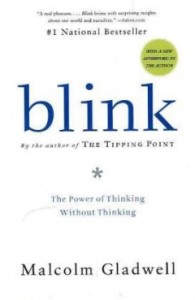 Blink: The Power of Thinking Without Thinking by Malcolm Gladwell provides an interesting study into the art of coming to a conclusion based on the observer’s snap judgement and first impressions. When burdened with facts, decision is often clouded. However, according to Gladwell, snap judgments and first impressions can be educated and controlled.
Blink: The Power of Thinking Without Thinking by Malcolm Gladwell provides an interesting study into the art of coming to a conclusion based on the observer’s snap judgement and first impressions. When burdened with facts, decision is often clouded. However, according to Gladwell, snap judgments and first impressions can be educated and controlled.
An example Gladwell gives for this phenomena is a marble statue, a kouros, which was said to be dated back to the sixth century BC. Experts studied the various features and concluded its authenticity. But then a snap judgement, what Gladwell describes as thin-slicing, occurred from another expert. The statue didn’t “look right.” As it turned out, all the knowledge accumulated by experts couldn’t deny the fact that, once pointed out, the statue wasn’t what it was presented to be.
Another example of the power of a blink-of-an-eye decision is the current practice of having candidates auditioning for a symphony orchestra play behind a screen for anonymity. In the past, a woman auditioning for a position wouldn’t have had a chance. The listener’s viewpoint would be clouded by thinking a woman wouldn’t have the lung power or stamina to properly play, say, a wind instrument. In 1980, candidates auditioning on trombone for Germany’s Munich Philharmonic were placed behind a screen to avoid bias. As it happened, a woman was among those auditioning and the conductor strongly voted in her favor. When it was revealed it was a woman, the judges were amazed, and dismayed. A woman in a symphony orchestra? That started a trend. Rather than lengthy discussions on awareness programs, assertive training, social discrimination, etc., the problem about who is the best player is determined by blind auditions. A decision is made without the bias of gender clouding the issue. Today, thirty years later, approximately 50 percent of symphony players are women.
Without giving it thought, many of our decisions are based on bias, even when we know it isn’t fair. If we remove bias we often come to a different decision. Many people have the skill to quickly size up a situation. They don’t dwell on a person’s race, his clothes, what car he drives, or where he lives. Skilled rapid decision makers have developed an inner sense to accurately assess a situation based on a “gut feeling” or rapid cognition. Some people are born with this skill; others have developed it over time.
Although in places Blink gets somewhat off-track, I think Gladwell’s premise is worthy. We often talk something to oblivion, becoming blinded by too much information. Although snap judgements aren’t always accurate, there can be merit in listening to our gut feelings about a situation before it gets cluttered with facts.
I recommend Blink. I found it entertaining, but more, I found it helpful in determining how to make decisions without the clutter of weighing every aspect of the problem.


An intersting review. I think all of us at times have made decisons based on intuition. Thank you, Mary, for explaining the process as described in the book.
Hema
I agree. I think we’ve all experienced this. But, with practice, we can make this process even more useful to us.
Aprlpentay this is what the esteemed Willis was talkin’ ’bout.
A great review, Mary, about an interesting “psychological” look at how people’s first impressions, or perceptions, make the world what it is today.
Thank you, Alice. Although on some level I knew much of this, it was interesting to see it substantiated.